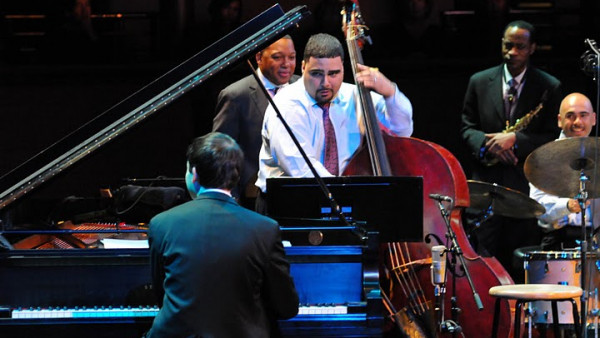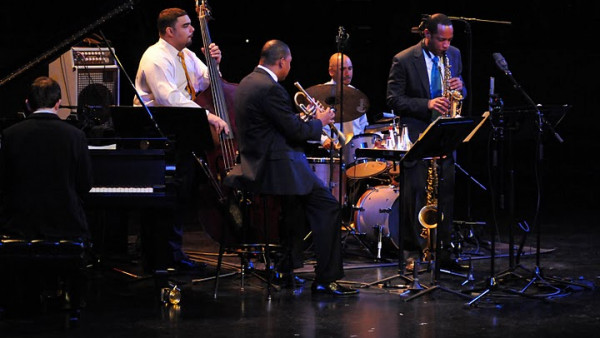Away From His Desk, Up on the Bandstand
Wynton Marsalis has been making albums for the last 30 years, since the release of his self-titled Columbia debut. Through all but the first six of those years, he has been not only a celebrated trumpeter and composer but also the public face of Jazz at Lincoln Center, an organization built around his vision, and in many ways still propelled by it.
That overlap says a lot about the reception of Mr. Marsalis’s music, which tends to be rapturously received in some quarters and effectively ignored in others. And it helps explain the difficulty of disentangling Mr. Marsalis’s fruits as an artist from his function as an artistic director. (Vitoria Suite, released last fall on Emarcy, documents one of his newer works for the Jazz at Lincoln Center Orchestra; Here We Go Again, just out on Blue Note, features him with Willie Nelson and Norah Jones, in a program from the 2009 season.)
On Thursday, in the first night of a three-night residency at the Rose Theater, Mr. Marsalis spotlighted his own music, foraging as far back as 1985. A lot of his recent writing has been for large ensembles, but here he limited himself to two smaller ones: his current quintet (in the first half) and a version of his 1990s septet (in the second). As a retrospective survey it was slanted and incomprehensive; as a concert it was clear-headed, sturdy and engaging, with Mr. Marsalis himself in superlative form.
He’s among the precious few jazz instrumentalists — let alone trumpeters — capable of conveying relatable emotion through the hard lens of virtuosity. Again and again he focused the energies in the room with a single phrase or, thrillingly, an unpredictable stream of them. On “The Majesty of the Blues,” which opened the second half, he used a plunger mute to fashion a manifesto of guttural growls and high trills. “Sparks,” an uptempo blues featured on an iPod commercial, had him breezing through an eighth-note slalom, like the young Clark Terry.
What has changed over the years, far more than his command as a soloist, is the dynamic within his bands.
“Most of the gentlemen here I taught when they were in high school,” he said of his quintet, with the saxophonist Walter Blanding Jr., the pianist Dan Nimmer, the bassist Carlos Henriquez and the drummer Ali Jackson. They opened with “Black Codes,” an anthem from a time when Mr. Marsalis’s working band was more of a combative peer group. Somehow that tune felt wan and dutiful, and so did the one that followed, a rickety two-step called “You and Me.” They weren’t off to a great start.
The corrective arrived quickly, with “First Time,” a tune involving Afro-Cuban rhythm and a dizzyingly intricate melody etched by Mr. Marsalis and Mr. Blanding. Once that bar had been cleared, the band loosened up: “Doin’ (Y)Our Thing,” another fairly recent piece, twinkling with Copland-esque harmony, sounded fresh and assured.
But there was so much more soul and slang within the septet — featuring musicians like the drummer Herlin Riley, the alto saxophonist Wessell Anderson and the bassist Reginald Veal, all contemporaries of Mr. Marsalis — that it produced a conspicuous imbalance. Part of this was experience; part of it was the urgency of Mr. Marsalis’s writing for a midsize group, with its four-man front line. He still hasn’t composed anything more bracingly soulful than “Sunflowers,” which ended the evening in a jubilant state.
That piece was borrowed from The Marciac Suite (Columbia), released in 2000; so was “Mademoiselle D’Gascony,” which came in the first half. A warm but melancholy ballad, it featured Mr. Marsalis squarely, and he responded with a masterly essay, terse and ravishing and poignant. The eruption of cheers that followed was for him, and him alone.
by Nate Chinen
Source: The New York Times


